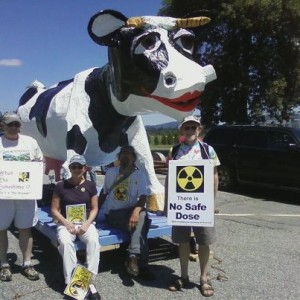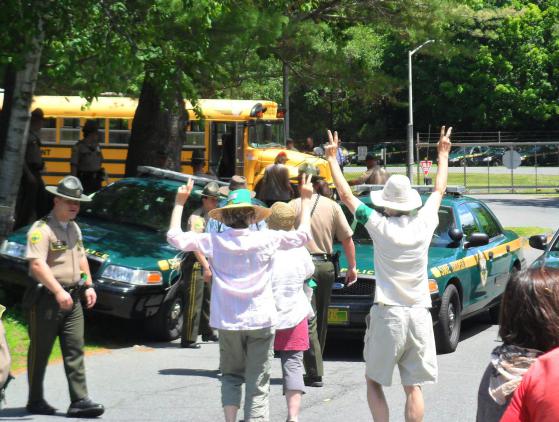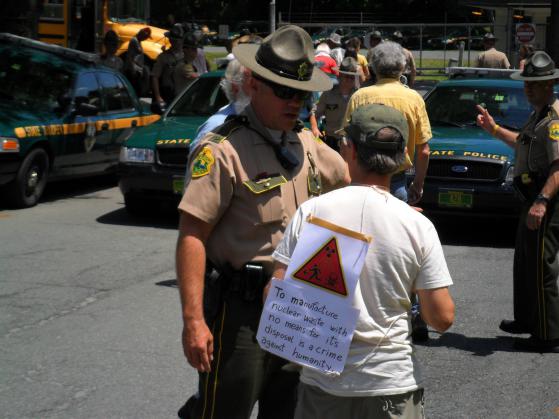By Susan Smallheer, Staff Writer, Rutland Herald
VERNON — More than three dozen anti-nuclear activists were arrested Sunday afternoon [July 1] at the front gates of the Vermont Yankee nuclear power plant, the latest demonstration in what organizers say will be continuing protests until the 40-year-old reactor is shut down.
The good-natured protest, under sunny skies and with temperatures pushing 90, was led by a giant Holstein cardboard cow, made by Sharon puppetry artist Ria Blaas. Many of the protest signs had a decidedly bovine theme.
“Vermont has voted Entergy Moooooooove Over!” said one.
“It is a Trojan Cow,” said Blaas, whose sculpture’s stomach opened to provide dozens of small, replica cardboard solar panels that the protesters held aloft as about 250 additional protesters serenaded State Police troopers to a Vermont Yankee version of the song “Down by the Riverside.”
The protest came after Yankee was at reduced power for two straight weeks. A motor powering one of the reactor’s cooling water pumps burned out. Repairs are 99 percent complete, a plant spokesman said Sunday.
Blaas and a group of friends led the procession to the plant, with the group wearing sunburst hats and carrying sapling staffs, topped with a working windmill, followed by “Rosie the Trojan Cow,” who had a big lipsticked smile.
Deb Katz, executive director of the Citizens Awareness Network and a member of the umbrella group SAGE Alliance which organized the protest, said similar events will continue until Entergy Nuclear shuts down Vermont Yankee.
“This is about Vermonters’ resolve,” said Katz. “Entergy is refusing to abide by its agreements and contracts.”
Katz and others made a point of saying their complaint was not with the state of Vermont — or the Vermont State Police — but with Entergy. She said Entergy was ignoring “the will of the people” by continuing to run Yankee past March 21, 2012, when its state permit expired.
A federal court decision in January has kept the plant running, and an appeal of that decision is pending in the 2nd Circuit Court of Appeals.
“Seven states attorneys general have signed on” to Vermont’s appeal, Katz said.
Demonstrators, who arrived in Vernon by bicycle or bus from a morning rally on the Brattleboro Common, were greeted by an impressive squad of police cruisers, lined up across the entrance to the plant.
State Police Capt. Raymond Keefe said after the demonstration that 38 people were arrested without incident. Most of the people were loaded onto a waiting school bus and trucked to the Putney Fire Station where they were processed for trespassing and released.
Keefe said 40 troopers from all over the state were at Vermont Yankee to handle the protest, and he had expected there would be more arrests.
“We wanted to make an impression,” he said.
While the troopers stood waiting for the protest to end, Entergy Nuclear security, dressed all in black, videotaped the scene.
Sunday’s protest was much smaller than the March 22 demonstration, where more than 150 people were arrested, with 1,200 people marching to Entergy corporate offices.
Sunday’s act of civil disobedience resulted in the largest arrest at the gates of Vermont Yankee is in several years.
With one rare exception, criminal charges against the anti-nuclear protesters in recent years have all been dropped by the Windham County state’s attorney’s office.
Katz said Sunday’s protesters were from Vermont, New Hampshire and Massachusetts, were a combination of veteran and first-time demonstrators.
“It’s not over,” she said. “We’re winning. The governor wants it to close, the Legislature wants it to close. It will close. It will happen, one way or another, either in court or before the Public Service Board. ”
Entergy Nuclear spokesman Robert Williams said the company thanked the state and local police for their work.
“We appreciate those who support the plant and respect the rights of plant opponents to make their opinions known. Our focus is squarely on operating the plant safely and reliably,” said Williams.
xxx
Dozens Arrested at Valley Nuke Protest
Dozens of anti-nuclear activists were arrested July 1 for non-violent civil disobedience at the entrance to the Vermont Yankee nuclear power reactor. Supporters cheered from nearby. Vermont Yankee is three miles from Massachusetts and a stone’s throw from New Hampshire. It’s owned by Entergy corporation of Louisiana.
The protest was organized by www.NukeBusters.org and other groups. Similar events are planned in the future. These photos were taken on July 1 at Vermont Yankee by Eesha Williams. To enlarge a photo, click on it, then scroll down and click “see full-size image.”
At Vermont Yankee, a major accident or act of sabotage would kill thousands of people and leave an area the size of the Valley uninhabitable. Such a disaster is so likely that no insurance company will insure the facility; taxpayers would pay the costs of a meltdown. The hundreds of tons of nuclear waste at Vermont Yankee is the most toxic material on earth. The waste is so dangerous that it must be guarded 24 hours a day for the next 1 million years, according to the federal government. The electricity from Vermont Yankee is not needed, according to the state of Vermont.
On May 2, 1977, police arrested 1,414 protesters at the Seabrook nuclear power plant in New Hampshire. In June 1978, some 12,000 people attended a protest at Seabrook. In August 1978, almost 500 people were arrested for protesting at the Diablo Canyon nuclear power plant in California. In May 1979, in Washington, D.C., about 70,000 people, including the governor of California, attended a march and rally against nuclear power. On June 2, 1979, about 500 people were arrested for protesting construction of the Black Fox nuclear power plant in Oklahoma. The next day, 15,000 people attended a rally at the Shoreham nuclear power plant on Long Island; about 600 were arrested. On June 30, 1979, about 38,000 people attended a protest rally at Diablo Canyon. On Aug. 23, 1979, in New York City, about 200,000 people attended a rally against nuclear power. On Sept. 23, 1979, about 167 protesters were arrested at Vermont Yankee. On June 22, 1980, about 15,000 people attended a protest near the San Onofre nuclear power plant in California.
No new nuclear power plants have been ordered and built in the U.S. since 1978.
Protests preceded the shutdown of the Shoreham, Yankee Atomic, Millstone I, Rancho Seco, Maine Yankee and at least a dozen other nuclear power plants. An article in the June 2007 issue of the Journal of American History did not hesitate to give protesters credit for the decline of the nuclear power industry: “The protesters lost their battle [when Diablo Canyon opened in 1984], but in a sense they won the larger war, for nuclear plant construction ended across the country in 1986.”
Bob Mulholland ran a successful campaign to close the Rancho Seco nuclear power plant near Sacramento, Calif. Rancho Seco was closed in 1989 because the people of Sacramento voted to close it.
Mulholland, who now works for the California Democratic Party, told the Valley Post that the nuclear industry dramatically outspent the antinuclear groups in advertising before the referendum vote.
“David can beat Goliath,” he said. “We had a New England Town Meeting-style community debate and people saw that the industry was lying. Closing Rancho Seco was the best thing our community ever did.”
——–
More information about Vermont Yankee, and the mass movement to close it, is at:
www.ValleyPost.org/2011/03/14/japan-quake-puts-valley-nuke-local-spotlight


